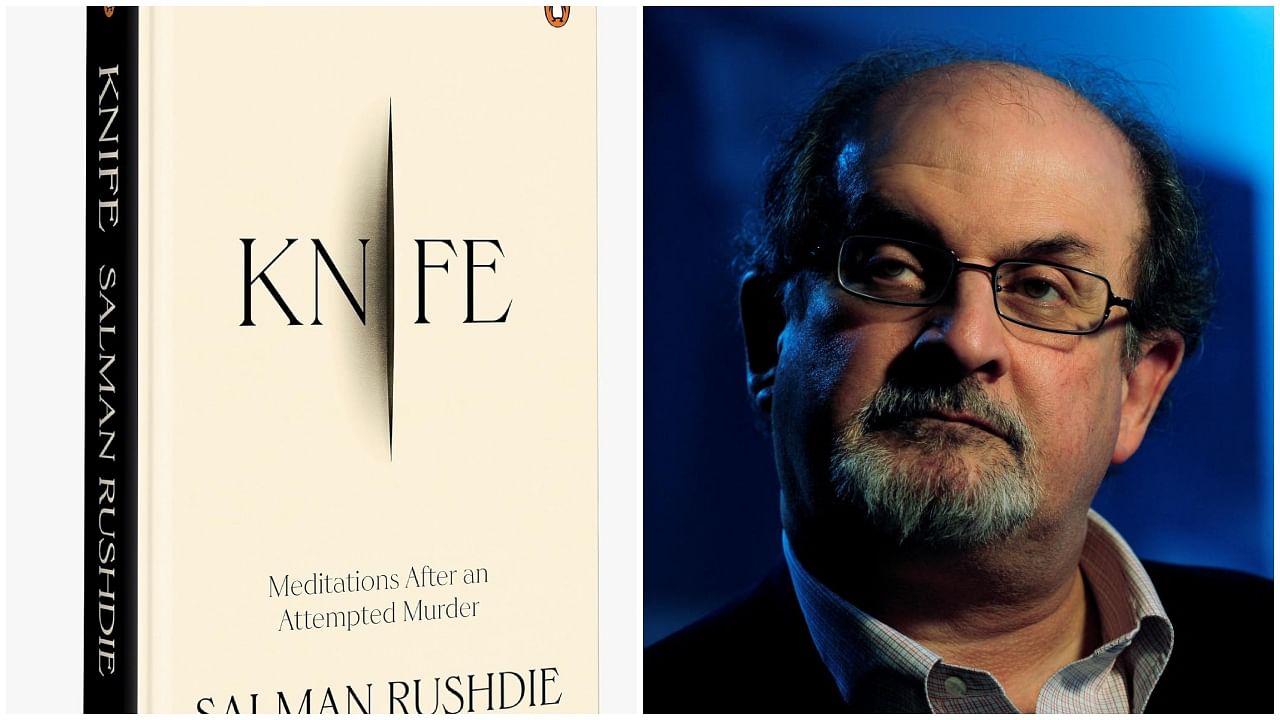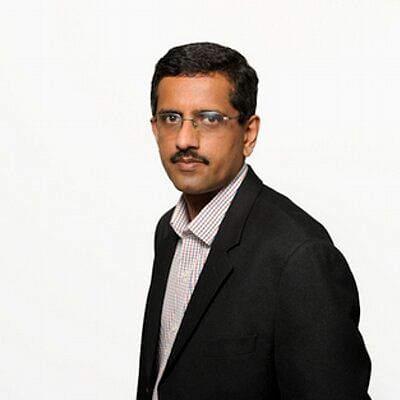
The cover of 'Knife' by Salman Rushdie.
Credit: Special Arrangement, Reuters
Knife is an important book. Not because it is an unforgettable work of art — it isn’t — but because of who wrote it, when they wrote and why they wrote it. It is also short, sharp and knife-like, and mercifully easier to read than the average Salman Rushdie creation. Importantly, it strikes out at religious absolutism and underlines truths about the place of writers such as Rushdie in this fast-changing, angry world.
It’s less than two years since a Lebanese youth jumped on a stage in Chautauqua, New York, and savagely stabbed the Indian-born writer as he prepared to speak on, ironically, the importance of keeping writers safe from harm. Rushdie was an obvious choice both to speak on this topic and to be the victim of such an attack: His Satanic Verses had sparked a fatwa from Ayatollah Khomeini in 1989, putting a price on his head that sent him underground for a decade.
Knife is the story of the New York attack and its aftermath, and through an ingenious, imagined conversation with his failed assassin, Rushdie’s literary revenge on the vacuousness of religious intolerance of any stripe.
A white-knuckle ride
For much of its 209 pages, it is a straight narrative, starting with the 27 seconds of mayhem on stage and Rushdie’s recovery from life-changing knife wounds that lost him the use of one eye. This is engrossing enough, in a horrifying way — a description of his eye bulging out of its socket and hanging down his face ‘like a large soft-boiled egg’ is particularly disturbing. Rushdie looks back in graphic, honest detail on the seconds, hours and weeks that followed the attack, a white-knuckle ride that appears to have been bearable purely due to the subject’s own resilience and the support of a close-knit and loving family, the literary fraternity, and world leaders like US President Joe Biden and his French counterpart Emmanuel Macron, who spoke out strongly when the outrage took place.
Rushdie, who has an eye for detail and a memory both for slights and support received, notes that India ‘on that day found no words’. Indeed, a recurring theme in the narrative is the importance the country of his birth holds for Rushdie — his ‘deepest inspiration’ — and what it thinks; he wears his Indian origin on his sleeve not because it is handy but because he seems to genuinely care. All the more reason to pay attention when he speaks of his anguish at the majoritarianism gaining ground in India (which could explain why the country’s leaders found no words — they probably didn’t want to look for them).
The book is largely shorn of Rushdie’s literary flourishes and flights of imagination. An initial bout of wordplay regarding his ‘would-be Assassin...the Asinine man who made Assumptions about me’ sits awkwardly in the overall scheme of things. And Rushdie appears almost piqued that the killer hasn’t done his homework, having read only a couple of pages of the author’s books and watched some YouTube videos: it’s almost as if the attack would have been more acceptable to its victim if the knife-man held a PhD on the Satanic Verses.
Indeed, and understandably, Rushdie is fascinated by the Lebanese youth, and some of the best parts of the book are devoted to the man who almost killed its author. Rushdie uses Socrates’ quote: ‘The unexamined life is not worth living’ to analyse the young man, making an ‘unkind guess’ that ‘this was not somebody who lived an examined life’, surely one of the more cultured ways to destroy a would-be killer.
‘Literalism is a mistake’
This characterisation is underlined in a riveting, imagined conversation in jail between Rushdie and the attacker, a device Rushdie uses to get across his views on a range of topics through his line of questioning. Predictably, this pretend — but very plausible — version of the assassin struggles with anything outside his monochromatic world, is uncomfortable with anything personal and takes refuge in the ‘truth’ that he ‘knows’. Rushdie slyly gets across the point that the word of God went through several ‘translations’ before it got to the young fanatic, right from the Archangel to the Imam whose videos so radicalised him.
Then follows something Rushdie clearly intends as a central message to his attacker: “I’m trying to suggest to you that, even according to your own tradition, there is uncertainty. Some of your own early philosophers...say everything can be interpreted, even the Book. It can be interpreted according to the times in which the interpreter lives. Literalism is a mistake.”
And why are Rushdie and his ilk still important? The simple truth, in the author’s words, is that art challenges orthodoxy. “It accepts argument, criticism, even rejection. It does not accept violence. And in the end, it outlasts those who oppress it.” Rushdie’s work — and his life — are often difficult to understand or appreciate. But there’s little doubt that he has, over the years, produced the sort of art that has challenged the prevailing doctrine. Knife is the story of how that work and that life was almost snuffed out; in the event, art gains from the fact that Rushdie, as old as independent India, lives on, unapologetic, sharp and fuller than ever of conviction.
